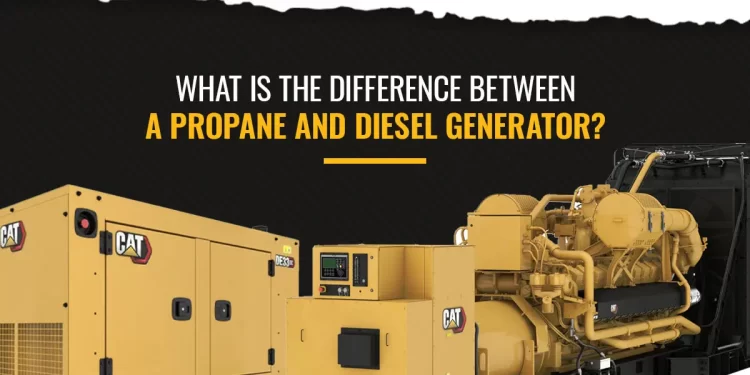If you’re in the market for a generator for your business, the type of fuel it takes is one of several factors you’ll need to consider. A generator’s fuel type affects the upfront and operating costs, environmental impact, maintenance requirements and other elements of ownership.
Understanding the differences between propane and diesel generators is essential to choosing the right one for your needs.
What Is a Propane Generator vs. a Diesel Generator?
The most apparent difference between propane and diesel generators is the fuel source. Propane, also known as liquified petroleum gas (LPG), is processed from natural gas. Diesel is a combustible liquid typically produced from crude oil.
You may also notice that diesel generators have a smaller, more compact design because they include an embedded fuel tank. A propane generator requires the connection of an embedded tank, which consumes additional space.
Advantages and Disadvantages of Propane Power Generators
Propane generators offer several benefits:
- Availability: The U.S. produces approximately 70% of the world’s diesel fuel supply. The fuel is readily available, and you can enjoy convenient delivery to your business.
- Low noise: Propane generators operate quietly, making them ideal for use at businesses or locations that require minimal disruptions.
- Eco-friendliness: Clean-burning propane is safer for the environment than diesel and other fuel sources.
Disadvantages of propane generators include:
- Reduced efficiency: Propane generators produce less energy and consume more fuel than their diesel counterparts.
- Higher operating costs: The lower fuel efficiency means that propane generators cost more to operate than diesel equipment. Maintenance costs also tend to be higher.
- Shorter life span: Propane generator engines aren’t as efficient as diesel models, and they offer a shorter life span.
Advantages and Disadvantages of Propane Power Generators
Advantages of diesel generators include:
- Increased efficiency: Diesel generators require about 67% less fuel to produce the same amount of power as propane products.
- Reliability: Diesel equipment breaks down less frequently and doesn’t require as much preventive maintenance.
- Increased power output: The higher energy density allows diesel products to generate more horsepower.
Diesel generators also have potential drawbacks:
- Higher upfront costs: Although they’re cheaper to operate over time, diesel generators are more expensive to purchase than propane models.
- Emissions: Diesel generators release carbon, nitrogen oxide and other substances into the atmosphere.
- High noise levels: These generators are loud during operation, sometimes calling for the installation of soundproof barriers to limit the noise.

